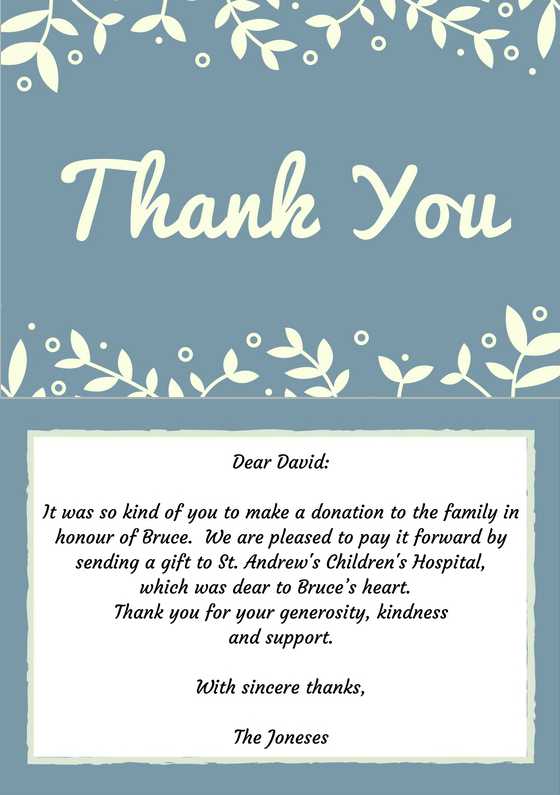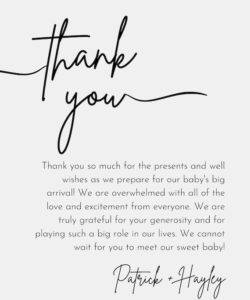In times of profound loss, the simple act of expressing gratitude can often feel like a daunting task. The period following a funeral is a whirlwind of emotions, administrative details, and often, quiet reflection. Yet, amidst the grief, many people extend their warmth, support, and practical help, which can be an invaluable comfort to those navigating such a challenging time.
Acknowledging these gestures of kindness, however big or small, becomes an important step in the grieving process. It’s a way to let others know their presence and thoughtfulness made a difference. While the thought of writing notes might seem overwhelming when you’re already coping with so much, even a short, sincere message can convey your appreciation effectively.
This is where thoughtful funeral home thank you wording comes into play. It doesn’t have to be elaborate or poetic; rather, it should be genuine and reflect your feelings. Whether you’re thanking a friend for bringing a meal, a family member for their unwavering support, or the funeral home staff for their compassionate guidance, the right words can offer a meaningful touch of closure and appreciation.
The Comfort and Connection of Expressing Thanks
Expressing thanks after a funeral is more than just good manners; it’s a vital part of acknowledging the community of support that surrounds you during a period of intense vulnerability. When a loved one passes, the world can feel like it has shifted on its axis, and the kindness of others often serves as an anchor, helping to steady the ship through turbulent waters. Taking the time to craft a thank you note, even weeks or months later, can be a therapeutic act for the sender, allowing a moment to reflect on the positive contributions people made.
These notes serve as a bridge, reinforcing the bonds of friendship and family. They communicate that their efforts were seen and valued, which can be incredibly meaningful to those who went out of their way to offer solace. People often hesitate to ask how they can help, but when they do, and their help is accepted and then acknowledged, it closes a circle of care that benefits everyone involved. It shows that even in sorrow, gratitude can find a voice.

Consider the various forms of support you might have received. It could be a comforting hug, a prepared meal delivered to your doorstep, a generous donation made in your loved one’s name, or simply someone’s presence at the service. Each gesture, regardless of its magnitude, stems from a place of care. A thank you note recognizes this care and validates the effort made by the giver, ensuring they know their compassion was appreciated.
The staff at the funeral home also plays an indispensable role during this delicate time, guiding families through difficult decisions with professionalism and empathy. Their quiet dedication behind the scenes ensures everything runs smoothly, allowing families to focus on remembering their loved one. A specific note of thanks to them acknowledges their professional service and personal compassion.
Ultimately, these expressions of gratitude help to solidify the loving memories of the deceased by acknowledging the living network that cherished them. It’s a way to extend the feeling of connection beyond the immediate period of mourning, reminding everyone that love and support continue to endure. It truly reinforces the idea that we are not alone in our grief, and that kindness is a powerful healing force.
Crafting Your Funeral Home Thank You Wording
Finding the right funeral home thank you wording can feel overwhelming, but remember that sincerity is key. Here are some ideas and samples to help you express your gratitude effectively to various individuals and groups:
- For general support: “Thank you for your thoughtful expression of sympathy during this difficult time. Your kindness means so much to us.”
- For flowers: “Thank you for the beautiful flowers you sent. They brought a touch of warmth and beauty to [Loved One’s Name]’s service.”
- For food or meals: “We are so grateful for the delicious meal you prepared. It was a true comfort and a tremendous help during this time.”
- For a charitable donation: “Thank you for your generous donation to [Charity Name] in [Loved One’s Name]’s memory. It’s a wonderful way to honor their life.”
- For specific practical help (e.g., driving, childcare): “We truly appreciate you taking the time to [specific act, e.g., drive us, watch the children]. Your help was invaluable and eased our burden immensely.”
- For the funeral director and staff: “Our sincere thanks to you and your compassionate staff for your professional guidance and support during [Loved One’s Name]’s funeral arrangements. You made a difficult time much easier to navigate.”
- For clergy or officiant: “Thank you for officiating [Loved One’s Name]’s service. Your words brought comfort and peace to all who attended.”
- For pallbearers: “Thank you for serving as a pallbearer for [Loved One’s Name]. We appreciate your support and the honor you showed them.”
- For friends who traveled: “It meant so much to us that you traveled all the way from [Location] to be with us during [Loved One’s Name]’s funeral. Your presence was a great comfort.”
- For a thoughtful card or message: “Thank you for your heartfelt card and kind words. They truly touched us and provided much-needed solace.”
- For long-term emotional support: “Thank you for your unwavering support and friendship during this challenging period. Knowing we can count on you means the world.”
- For sharing a memory: “Thank you for sharing your wonderful memory of [Loved One’s Name] with us. It brought a smile to our faces during a sad time.”
Taking the time to acknowledge the support you’ve received is a meaningful way to honor both your loved one and the community that surrounds you. These notes don’t need to be sent immediately; often, it’s beneficial to wait until you feel ready, allowing the words to come from a place of renewed peace. The simple act of saying “thank you” can bring a quiet sense of healing and connection, reinforcing the bonds that carry us through life’s most challenging moments.


